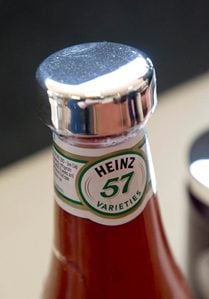Here’s Why There’s a 57 on Your Heinz Ketchup Bottle
Updated: Feb. 22, 2023
No, there aren't 57 types of Heinz ketchup.

Ketchup is probably the most controversial of all the condiments. Some spell it ketchup, others catsup. Some say it has the prefect combination of sweet, salty, and umami flavors, others describe the taste as sugary tomato water. Even eating the stuff is up for debate; the National Hot Dog and Sausage Council declared that putting ketchup on a hot dog is completely unacceptable for people over this age.
And then there’s the ketchup bottle itself. The Heinz slogan, “57 varieties,” has become iconic since its origin in 1892, and it now appears on every ketchup bottle (and every other Heinz product). But does Heinz actually make 57 different types of ketchup? Are there 57 ways to make Heinz ketchup? Or maybe it has 57 ingredients?
No, nope, and definitely not. The answer to this plaguing question is surprisingly anticlimactic: It’s just a random number.
According to the Smithsonian, the inspiration for the slogan struck Henry J. Heinz while he was on a train. He saw an ad in a train car advertising “21 styles” of shoes and realized that “catchiness and resonance were far more important qualities for a company slogan than literal accuracy.”
All Heinz needed was a memorable number that consumers would automatically associate with his brand. At the time, his company sold more than 60 products, including mince meat, apple butter, pickles, and pepper sauce, but that didn’t influence his choice. He decided on 57 for a more sentimental reason: Five was his lucky number, and seven was his wife’s. (Obviously, not every husband can make such a gesture for his wife, but gents, you can start with these little ways to make your marriage happier.)
That bit of history sparks another debate in itself. Was Heinz just a greedy corporate schemer who couldn’t care less about false advertising? Was he a romantic for making his wife, who helped him build the business, part of a slogan that’s gone down in history for its effectiveness? Maybe a bit of both?
Whatever your opinion on this origin story, two things remain unquestionably true: Heinz knew how to write a memorable slogan, and he knew how to get on his wife’s good side.
[Source: Smithsonian]